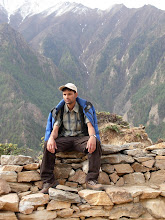Climate change and environmental research in the Himalayas are set to receive a boost with the announcement of a new research partnership between Japan and Nepal.
The Institute for Global Environmental Strategies (IGES) — a Japanese research agency focusing on sustainable development — will work with Nepal's International Centre for Integrated Mountain Development (ICIMOD) on climate change related issues, says a joint statement issued this month (1 October).
Their work will cover the Hindu Kush-Himalayas (HKH), a swath of mountain ranges stretching from Afghanistan to Myanmar, and covering Bangladesh, Bhutan, China, India, Pakistan and Nepal.
Megumi Kido, IGES public relations officer, says: "The two institutes will work together on four major areas: natural resources management and ecosystem services [processes and resources in the natural ecosystem that benefit humankind] like water resources, forest resources and watersheds, rewarding for ecosystem services including carbon financing, adaptation to climate change, and policy and governance."
The joint research will include adaptation and mitigation strategies to combat climate change. The agreement comes at a time when experts are pointing towards a huge lack of scientific information on various issues in the HKH region including glacier melting, and water and forest resources.
A 2009 ICIMOD report on the impact of climate change on water resources and livelihoods in the Himalayas says, "Climate change is affecting the amount of snow and ice and rainfall patterns in the Himalayan region, but there is a severe lack of data needed to understand these processes".
Pradeep Mool, a remote sensing specialist in the integrated water and hazards management division at ICIMOD, told SciDev.Net that the lack of consistent data has often confused citizens. "There is no consistency in the data on the area glaciers cover in the Himalayas. I also remember in 1997, when there was fear of the Tsho Rolpa glacier bursting in Nepal, the media published reports that it may flood Kathmandu — which was unrealistic as Kathmandu doesn't fall within its catchment."The bilateral agreement marks a major expansion in collaboration between the two agencies. Previous partnerships between the two institutes have involved the informal sharing of scientific data for analysis.



No comments:
Post a Comment